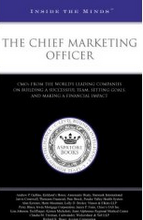 Listen up, because this is important to your professional reputation and career.
Listen up, because this is important to your professional reputation and career.Readers know I blog about the impacts of low trust on all kinds of human exchange and enterprise. Do you trust me as a credible expert? If you're not so sure, what action would you take?
Did I hear the word "Google"?
Well, google me and you'll get a bunch of corroborating evidence. I'm a seasoned chief marketing officer (CMO), I've contributed a chapter on trust to a marketing book and I speak about trust and reputation at conferences around the country. Unfortunately, a Google search on my name also serves up this result:
"A 25-year-old Goldsboro man -- wanted by New York City police on two murder charges -- was arrested Tuesday by Goldsboro police."
That other Jarvis Cromwell – who apparently is a couple of decades my junior – shows up on page 7 of my Google search listings. If you ever thought he was me, your opinion would surely change. Which is why online reputation is so important, and that brings us to Stephanie Fierman.
Last week Stephanie Fierman, a well known and respected marketing executive, spoke at a CMO Club dinner in New York and shared some thinking on managing online reputation. You can find coverage on this topic by Anna Maria Virzi in ClickZ here. You can also read Stephanie's blog, here.
Stephanie got everyone’s attention by discussing how widespread gossip, innuendo and misinformation about executives are on the internet. And it is easy for executives to wake up one morning and find themselves the victim of misinformation or worse. And the more senior and visible you are in an organization, the more vulnerable you are to potentially damaging disinformation campaigns. The scary part of the story is that everyone from recruiters, to new hires to clients can and do check you out on the web.
So start taking action now. Here are a few of the tips Stephanie shared the other night:
1. Monitor your online footprint. Many people rarely if ever check out their search listings. That's a mistake. Make sure you check your online presence regularly on all of the search engines. You should also monitor online news services, newsletters, blogs, chatrooms and image banks.
2. Build your online reputation before you need it. If you haven't already done so, you need to begin creating search-engine friendly content before a crisis arises. Blog, post to other blogs, create a website, create online profiles (LinkedIn, Facebook, etc.) be active at work and in other activities that will get you mentioned online.
3. Respond quickly to damaging, inaccurate or slanted online content. If you find yourself attacked or worse online, don't hide. You need to respond quickly and authoritatively in the realm where the original content appeared, with clear and open messages and factual information. Tell the truth.
4. Be discriminating. If you participate in social networks, be very discriminating about whom you connect and what content you post!
5. Appeal to the webmaster. Ask the webmaster to remove questionable or defamatory content. Frequently they will.
In some ways, Google is bringing us back to a Victorian age when social circles were smaller and gossip could spread throughout a community like wildfire. There was little or no anonymity in those circumstances and ladies and gentleman had to vigorously defend their reputations because ruination was a real possibility.
The takeaway for trustmeisters: today's professionals live in a google-centric world where rumor and innuendo can be used against them. All the more reason to manage your personal reputation proactively and with care.



